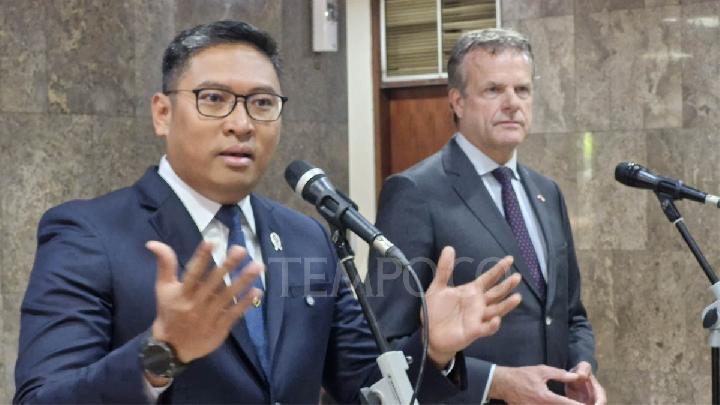TEMPO.CO, Jakarta - The Indonesian government initially took steps to repatriate Encep Nurjaman, also known as Hambali, a terrorism suspect currently detained in Guantanamo Bay, Cuba, back to Indonesia.
However, authorities have now decided not to permit the former terrorist leader’s return to the country once he is released.
Coordinating Minister for Legal, Human Rights, Immigration, and Law Affairs Yusril Ihza Mahendra stated that this decision stems from the fact that Hambali did not carry an Indonesian passport at the time of his arrest by United States authorities.
According to Yusril, the government has not obtained verified data or official documents confirming Hambali’s Indonesian citizenship.
"Hambali was arrested without showing an Indonesian passport, but a Spanish and Thai passport," Yusril said in a press release on Saturday, June 14, 2025.
Recap of Hambali’s Repatriation Attempts
Hambali was apprehended in Thailand on August 11, 2003. As the leader of Jemaah Islamiyah (JI), a terrorist organization affiliated with Al-Qaeda, he was first detained in Jordan before being transferred to the high-security US prison at Guantanamo Bay, where he was held without trial for years.
In August 2021, after 18 years in detention, Hambali finally faced trial in the United States. He stood trial alongside two accomplices, Mohammed Nazir bin Lep and Mohammed Farik bin Amin. The trio was charged with military crimes, terrorism, conspiracy, and murder.
The initiative to repatriate Hambali was first announced by Yusril in mid-January. He said his office would discuss the matter with President Prabowo Subianto and also communicate with the United States government.
"Regardless, Hambali is an Indonesian citizen. No matter how wrong our citizens are abroad, we must still pay attention to them," Yusril said on Friday, January 17, 2025, as quoted by Antara.
Yusril emphasized that the repatriation initiative reflects the government’s concern for Indonesian nationals facing legal trouble overseas. He stated that public awareness is necessary to understand that the government’s focus isn’t limited to foreign nationals detained in Indonesia, but also extends to its own citizens abroad.
However, the government appeared to grow hesitant. Although initially supportive of bringing Hambali back, Yusril later clarified that a decision had not been finalized. He made this statement following a press conference at the Immigration Office in South Jakarta on Tuesday, January 21, 2025.
"Up to this day, we have not reached a conclusion," he said. "So we have not decided to request his transfer to Indonesia."
The constitutional law expert noted that his office was still evaluating the possibility of Hambali’s repatriation. He added that coordination would be carried out with the Ministry of Foreign Affairs, the National Police, the Indonesian National Armed Forces, and the National Counterterrorism Agency (BNPT).
"So that later we will reach a conclusion on what we will do with Hambali. So do not think that we have already made a decision to request his return; it has not reached that stage yet."
Yusril acknowledged the legal complexities surrounding Hambali’s return, saying they must be thoroughly reviewed. He pointed out Hambali’s involvement in the 2002 Bali bombings. Under Indonesian law, criminal cases punishable by life imprisonment or the death penalty expire after 18 years.
Still, Yusril, who served as Minister of Justice and Human Rights during President Megawati Soekarnoputri’s administration, argued that Hambali’s crimes extended beyond the Bali bombings, indicating that prosecution in Indonesia remains possible.
"We will demand that he be sentenced to death here as well," Yusril told reporters at the Ministry of Legal Affairs, Human Rights, Immigration, and Law in South Jakarta on Friday, January 24, 2025.
He also acknowledged public concern over the potential resurgence of terrorism if Hambali returns. However, he stressed that the government must uphold justice for its citizens facing legal cases abroad and not simply leave Hambali in foreign custody. "I believe that this concern is something we respect," he said.
For now, Yusril confirmed that the government will not accept Hambali’s return. As a politician from the Crescent Star Party, he explained that Indonesia follows a single-citizenship policy. Based on Article 23 of Law No. 12/2006 on Citizenship, anyone who voluntarily acquires foreign citizenship automatically loses their Indonesian citizenship.
Therefore, he said, if Hambali legally obtained another nationality and never reapplied for Indonesian citizenship, then by law, he is no longer an Indonesian citizen. Yusril added that the government has the authority to refuse entry to any foreign national deemed a threat to national interests.
"In Hambali's case, the situation is still unclear. Therefore, the government's position is still waiting for clarity on his status and official documents," he said.
Yusril also emphasized the dangers posed by Hambali’s return. He reminded the public that Hambali was involved in the 2002 Bali bombings, which caused massive casualties, not only in Indonesia but also among citizens of neighboring countries, especially Australia. Furthermore, due to the passage of time, Hambali can no longer be prosecuted under Indonesian law.
"Based on Indonesian law, actually, if the crime is punishable by death or life imprisonment, there is a statute of limitations. If it's more than 18 years, the case can no longer be prosecuted," Yusril Ihza said in Jakarta on Friday night, January 17, 2025, as quoted by Antara.
Oyuk Ivani Siagian, Amelia Rahima Sari, Novali Panji Nugroho, Aliy Arivin, dan Alfitria Nefi P contributed to this article.
Editor's Choice: Indonesia's Home Affairs Ministry Finds No Data on Hambali in Civil Registry
Click here to get the latest news updates from Tempo on Google News































:strip_icc():format(jpeg)/kly-media-production/medias/3977835/original/066021800_1648524608-pexels-ahmed-aqtai-2233416_1_.jpg)
:strip_icc():format(jpeg)/kly-media-production/medias/3449231/original/035609000_1620241432-000_99C2L3.jpg)
:strip_icc():format(jpeg)/kly-media-production/medias/4678420/original/041411600_1701993066-pexels-thirdman-8489077.jpg)
:strip_icc():format(jpeg)/kly-media-production/medias/4779768/original/056174500_1711004488-hands-holding-knife-fork-alarm-clock-plate-blue-background.jpg)
:strip_icc():format(jpeg)/kly-media-production/medias/5134530/original/076641900_1739622826-20250215-Prabowo-AFP_7.jpg)
:strip_icc():format(jpeg)/kly-media-production/medias/3626995/original/056226000_1636431538-252444828_305857281141144_6357930935168472204_n.jpg)
:strip_icc():format(jpeg)/kly-media-production/medias/3508689/original/070798000_1626139545-20210713-Elon-Musk-SolarCity-5.jpg)
:strip_icc():format(jpeg)/kly-media-production/medias/1619105/original/061499300_1496997418-ramadan-main.jpg)
:strip_icc():format(jpeg)/kly-media-production/medias/4769102/original/014075000_1710171937-20240311-Taraweh_Pertama_di_Istiqlal-ANG_1.jpg)
:strip_icc():format(jpeg)/kly-media-production/medias/5106410/original/089112900_1737608852-Buya_Yahya.jpg)
:strip_icc():format(jpeg):watermark(kly-media-production/assets/images/watermarks/liputan6/watermark-color-landscape-new.png,1100,20,0)/kly-media-production/medias/5140628/original/019242500_1740225866-Persita_Tangerang_vs_Borneo_FC-35.jpg)
:strip_icc():format(jpeg)/kly-media-production/medias/4878826/original/064720000_1719661833-WhatsApp_Image_2024-06-28_at_23.09.07.jpeg)
:strip_icc():format(jpeg)/kly-media-production/medias/3902213/original/084057500_1642045386-pexels-ralph-w-lambrecht-1446076__1_.jpg)
:strip_icc():format(jpeg)/kly-media-production/medias/5141412/original/005545700_1740364919-Snapinsta.app_481203089_18446336839077229_3957692586101845976_n_1080.jpg)
:strip_icc():format(jpeg)/kly-media-production/medias/771429/original/006248600_1416892825-m2.jpg)
:strip_icc():format(jpeg)/kly-media-production/medias/2265569/original/050855900_1530514161-20180702-Harga-Pertamax-Naik-di-Semua-Daerah--TALLO-4.jpg)
:strip_icc():format(jpeg)/kly-media-production/medias/2240997/original/070157500_1528277766-arches-architecture-building-460680.jpg)
:strip_icc():format(jpeg)/kly-media-production/medias/4787912/original/016408900_1711630423-20240328-Penukaran_Uang-AFP_6.jpg)
:strip_icc():format(jpeg)/kly-media-production/medias/5139103/original/083951400_1740056485-Screenshot_20250220_192744_Instagram.jpg)
:strip_icc():format(jpeg)/kly-media-production/medias/4290349/original/045313100_1673596178-cek_fakta_kemensos_dana.jpg)